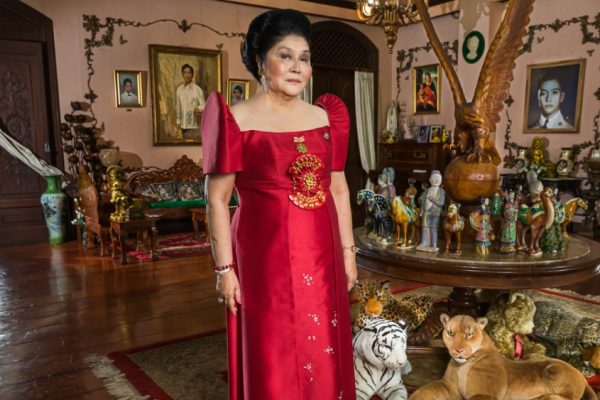Lies have found their place as currency in politics, haven’t they? Well, it’s certainly no different than the past. The only difference lies in the medium in which propaganda is broadcast. One woman who appreciates the value of an image, claiming to have solved the Cold War within ‘five minutes’, and rubbed shoulders with history’s wealthiest, influential is the former First Lady of The Philippines, Imelda Marcos; A fascinating woman who may play the part of the innocent ‘Mother’ of the nation but is first and foremost The Kingmaker. Following the death of her husband, President Ferdinand Marcos, she has her eyes set on a new King, her son Bongbong, ascending to the leadership of the Philippines.
What starts as a documentary, seemingly offering a platform for Marcos, turns into a nightmarish, honest and cold-cut horror piece of reality. The Kingmaker is as repulsive as it is engrossing, without resorting to forced perspective. Filmmaker Lauren Greenfield masterfully stitches the truth against Marcos as an unreliable narrator, producing an insightful documentary on the obsessive allure of power, wealth and legacy.
Refusing to maintain this platform, subverting it instead, Greenfield admits that upon meeting Marcos, she was unsure of the former First Lady’s intentions. Poised with an image in mind, it takes little time to realise that for Marcos, as with her life, this is another tapestry to weave. To paint her visage once more, to outright deny, distract and cast smoke around her history. The stories she tells, the way she feigns ignorance to the billions she and her husband robbed from the Filipino public and the attempt to control the direction of the documentary, Imelda Marcos is no ‘trophy’ first lady, but a tactician.
Refuting this, Greenfield seamlessly provides rebuttals to Marcos’ attempts at drawing her narrative. Without false pretense or unneeded pathos, brutal accounts of the martial law, the sexual assault and violence the people suffered under the Marcos’ rule are played directly after interview segments. The Kingmaker’s editing is fluid, without awkward transitions of showcasing, instead noting the importance of reporting a direct truth against the lies told. We flow from Marcos’ words of vindication for her family to the imagery of poverty, a broken nation and first-hand accounts of the brutality they suffered.
Expanding on this unreliable nature, Greenfield’s documentary-style achieves a precise cinema verité in the construct of multiple scenes. Enabling multiple shots to have this ‘fly on the wall’ reach means that when Marcos’ pre-planned image fails, Greenfield captures the moment. It’s an open form of cinema where the camera is acknowledged, a raw documentary style which captures every motion, smile or servant bustling away with photos, portraits or bags filled with cash.
Reflecting her privilege, Lars Skree and Shana Hagan’s cinematography knows precisely where to focus in the Marcos family home, without obvious crassness. Framing Marcos near the stolen paintings she claims to have never owned, their cinematography forces nothing. Instead, it allows Marcos to fall on her opulence. Candidly walking, showcasing her prized Picassos or Michaelangelos, Skree and Hagan capture the decadence in which Marcos lives, contrasting it with wide shots of the countryside, which then crash into the reality of the surrounding slums of the Philippines.
The Kingmaker is a sublime piece of cinema verité, and moulds itself around the subject, acknowledging the attempts Marcos makes in constructing an image she can ‘sell’ to the world to reclaim former glory. Greenfield’s film is no less brave than it is insightfully smart, rather than direct opposition to the Marcos family, it humbly presents indisputable accounts to provide a balanced documentary, mesmeric in its deconstruction of dictatorial corruption and its analysis of lies.
@Filmhouse, Edinburgh until Thu 19 Dec 2019
